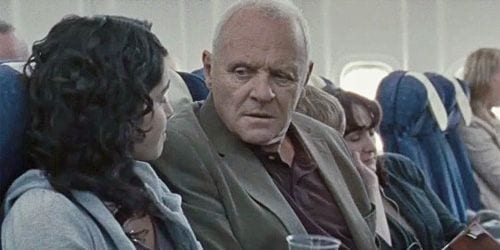
There was a time in cinematic history when the assembling of an international ensemble cast peppered with major film stars often involved cigar-chomping Hollywood moguls with huge scripts and even huger wallets, all working within the monolithic studio system and turning out epic productions – usually war films — full of pyrotechnic wonder (The Longest Day, Battle of the Bulge and A Bridge Too Far being excellent examples).
Based on Arthur Schnitzler’s play La Ronde, 360 also features an international ensemble cast. Alas, it’s the absolute antithesis of those exciting, commercial and internationally glossy spectacles of the past. In fact, with the exception of a fairly tense and rather incongruous final scene, there aren’t really any dramatic peaks and troughs in the film at all; instead, 360 features a gentle, meandering narrative that focuses on a variety of characters in various cities around the world, all attempting to deal with relationship and career issues.
To examine these fractured lives, the award-winning British screenwriter Peter Morgan and the Brazilian director Fernando Meirelles — the latter a recipient of international critical acclaim for his excellent films City of God and The Constant Gardener – weave together a series of well-performed vignettes, each scene showing how the various characters’ problematic lives begin to overlap.
Among them are Mirka (Lucia Siposova), a materialistic young Slovakian woman who decides, against her sister’s advice, to turn to prostitution, and John (an excellent and moving Anthony Hopkins), a British man travelling to America to search for his missing daughter. John befriends Laura (Marina Flor), a beautiful young London-based Brazilian woman passing through a Coloradoan airport on her way home to Rio de Janeiro; Laura has just left her boyfriend Rui (Juliano Cazarre) over his affair with a British woman, Rose (Rachel Weisz).
Whilst at the airport, Laura becomes distracted from John’s fatherly attention by the prospect of a romantic liaison with Tyler (an intense and twitchy Ben Foster), a young American who is, unbeknownst to Laura, a newly-released offender trying desperately to fight his criminal urges.
Perhaps the biggest star to share the lead billing with Hopkins is Jude Law, who plays Michael, a wealthy businessman contemplating a tryst with the aforementioned Mirka, despite the fact that he’s already married to Weisz’s Rose. To complicate matters, it is Rose who has been having an affair with Laura’s boyfriend Rui, which was the cause of Laura leaving London in the first place.
This certainly illustrates how cyclical and complex the screenplay is, but whilst it’s initially fascinating to see how these cleverly-written characters’ lives intertwine and connect, the production’s general lack of spark leaves a whiff of stagnation as the film progresses.
That said, it’d be unfair to write off 360 entirely, and it certainly received some undeservedly harsh reviews on its initial release. Despite a lack of energy, the film still contains moments that are mature, heartfelt and wise, particularly when examining the concepts of destiny and control.
360 is essentially about the consequences of the choices we make, but it also suggests that for all our attempts to attain some semblance of control over our lives, we never really have any autonomy at all. Is our life experience, as the film often suggests, merely comprised of a series of coincidences and situations we fall into and out of, enjoy and suffer?
Without attempting to offer conclusive answers to the inconclusive and philosophical crises the film presents, the filmmakers instead acknowledge the dichotomous nature of the struggle to control essentially random and haphazard lives; this is best articulated with the inclusion of an infamously cack-handed quote, which bookends the film: “A wise man once said, if there’s a fork in the road, take it”.
In other words, we can believe we are creating order for ourselves by planning and choosing which paths to take, but we never really know what will happen to us. Like the characters in 360, we plan and we make choices, and we are then forced to endure the problems that those choices befall upon us.
Despite this, what do we always seem to do when faced with sifting through the fragments of our troubled and broken lives, which are testament to the consequences of our actions? We resort once again to yet more planning, trying to make fresh choices that best deal with the very problems that our previous decisions created – and on and on it goes perpetually, an emotional carousel, a circle – a 360.
Extras on the DVD are adequate, and include cast and crew interviews and a trailer.

![Call for Papers: All Things Reconsidered [MUSIC] May-August 2024](https://www.popmatters.com/wp-content/uploads/2024/04/all-things-reconsidered-call-music-may-2024-720x380.jpg)



